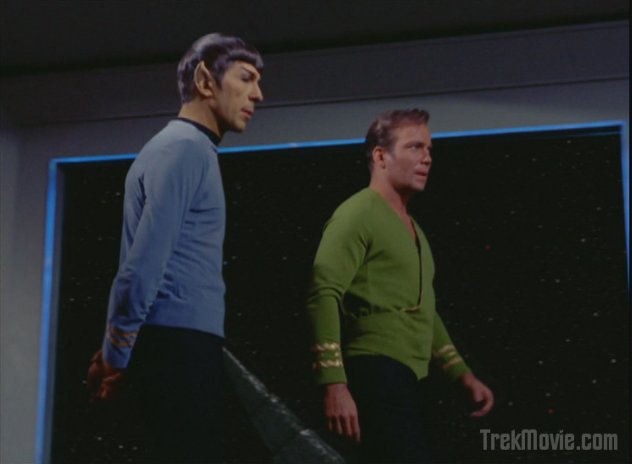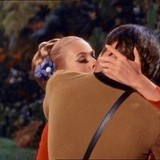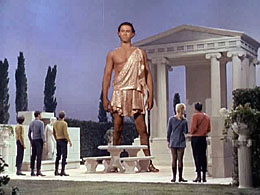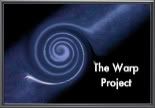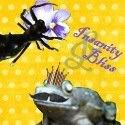TOS: Episode 36: CatspawAs the episode opens, Scott and Sulu are on away mission but missing. One away team member, Jackson, repeatedly notifies that he is ready to beam up, without response to the Captain’s inquiry on the whereabouts of Scott and Sulu. Upon arrival in the transporter room, however, Jackson is standing but immediately falls over—dead. McCoy informs Kirk of the surprise death, and then a dramatic voice over erupts through the ship notifying Kirk that a curse has been placed on all of them, and that if the Enterprise does not leave, they will all die. What of Scott and Sulu? What of Jackson’s condition? Who is this menacing, over-acting voice from space? These are the questions facing the Starship Enterprise in this episode “Catspaw.”
 Kirk and Spock meeting the magicians of "Catspaw"
Kirk and Spock meeting the magicians of "Catspaw"In response to the curse, and death of crewmember Jackson, the three leading officers of the ship beam down to the death-demanding planet. Wise move? No. But plot-driving risky maneuver? Oh, yes! Spock, my love, McCoy, and Kirk wander through the fog covered, gray and barren planet’s surface in search of their missing team. They head in the direction of life form readings picked up by Spock’s trusty tricorder. Strangely, back on board the Enterprise, the officer left in charge of the ship is one we have never seen before, and Chekov has impressively puffy hair. Shortly after arrival, the away team loses contact with the ship, and the officer in charge of the Enterprise reveals his strong ethical-disregard and lack of respect for others by shit-talking poor, loveable Chekov.
The planet’s surface is covered with vicious moaning reminiscent of Ancient Greek Fates—three wailing and strangely illuminated female-looking figures of decayed age chanting warnings of the future to the away team. Spock notifies us that the figures are unreal, as well as full of “very bad poetry.” Ah, Spock. I admire your frankness and accuracy.
The away team ventures on to chase down the “erratic, confused, but definitely real” life forms wandering about only several hundred meters away from them. It’s appreciable that the future relies on the metric system, even while having been written in the midst of the United States’s reliance on the English system. Chasing down the life form readings brings our officers to an eerie gothic-style castle— way to mix literary time periods,
Star Trek writers. Let’s see what they do with so many historical allusions at their disposal in one episode!
We discover that, though the Enterprise had initially been able to scan our away team’s life forms on the planet below, upon entering the castle the life form readings simply disappear. Somehow, it would seem, the castle is able to block out the ship’s scanners. Inside the castle, the team is lead into a trap by a black cat that seems to have more awareness than a simple earthen feline. The trap places our three officers locked up in chain shackles within a dungeon next to locked up skeletons too. Kirk and McCoy begin to appreciate the strangeness of Halloween-like earth manifestations. Spock finally theorizes that someone has generated the appearances of those things that terrorize man most at an instinctive level. It is at this moment that Scott and Sulu appear, but in some sort of automaton fashion, unable to respond to the orders of their captain, instead physically demanding the Captain to do their will.
As horrible as this may be to die hard
Original Series fans, it’s a bit of a relief to see Scott and Sulu over-under-act for once, rather than push their very specific caricatures too hard through this episode as well (that is, only over-act as they usually do). They are, after all, rather heavily designed character types; what, Scotty with his heavily “Scottish” play, and Sulu with his thickly serious-cum-laughing demeanor.
Scott and Sulu finally appear to our crew, release them from their chains, and then transport them, suddenly, to a sort of ruling chamber containing our black cat, and its apparent wizard. Whatever the source of our magician, he admits to not originating on the planet itself. He also shows us that he knows our away team officers far to well, and that he is somehow able to control Scott and Sulu, as well as communicate telepathically with his cat. It is in these moments when he also informs us that Spock is a “different one” whose thought is simply black and white, unlike the humans, who “see in color.” I must admit I am disappointed at the over simplification of Spock’s character here. Surely logic does not reduce to mere “black and white” thinking, nor does Spock’s virtue reduce to such obviousness either. Spock though, being the selfless, noble science officer that he is, is not insulted. Shortly after we hear that the illusionist actually admires our officers—seeing them as having fulfilled the tests of Aristotelian virtue such as bravery, loyalty, and clarity. Frustrated with his inability to bribe the away team, we see the wizard’s cat leave, and a seductive woman with hypnotic and telepathic powers return. The woman reveals that she controls our crewmembers, the ship itself, and their fate with her thoughts. Amazingly, by holding a model of the Enterprise over a candle she is able to raise the temperature of the ship itself. Thus, Kirk relents in his roguish demeanor enough to prevent the threat to his ship, but resists in revealing any information to the pair. It turns out the two demand to know things about the human world, in exchange for the safety of the ship itself.
McCoy is kept for the purposes of mind-probing interrogation, while Spock and Kirk are sent back to the dungeon. There the two begin to piece together the reality of the situation—aliens to our galaxy probing the human mind for knowledge of our scientific method. Obviously. Soon McCoy returns clearly hypnotized and under the control of the magicians. Kirk is unchained and led away by a semi-violent Bones. In the meantime, we see the magical pair conversing unobserved by the Enterprise crewmembers. We discover that the illusionists had traveled from a far away place (check!) sent on a mission (scientific method?) for what we do not know (oh. Heck.). But in the world and bodies with which they originate, they have no physical or emotional sensations. Now, having experienced desire and pleasure for the first time, the woman has become unwilling to give them up. As such, she is determined to forgo their mission and dominate the earth creatures. The man, however, is still loyal to their original plan and seems disturbed by her new demeanor.
As Kirk enters, the male magician leaves, and the woman reveals to Kirk that she desires him, and power too. Seeing an opportunity for escape, Kirk takes advantage of the woman’s weakness for physical sensation to overcome her control of them all. Kirk discovers she will not dominate him, because what she wants is free, willing union with Kirk. Though she’d never considered it before, now the woman realizes she wants to share power with another being. Together, she believes, she and Kirk can have all either of them desire. But for this to happen, he must want such power too. She offers to become any physically shaped woman he wants, and to help him experience the power of transmutation with her.
Oh, Kirk, you overdrawn sex-driven star traveler. You have finally stepped into the Kirk character we all remember. The one that travels the stars taking alien women freely for his own needs and purposes. The sexual drive that we all remember as integral to Kirk has only been loosely present until now. We've seen glimpses of what would develop into a central character trait for him, but now a third of the way through the second season it seems the
Star Trek writers have begun to recognize the shape it offers to their Captain. It is here, then, that part of the ethic of the
Star Trek universe takes hold. Kirk’s sexual prowess is all about conquering. He uses his sexual interest, and apparent attractiveness to overcome those he wants, and to take control of the worlds he explores. It is a power, not for union, as our female magician would want, then. Instead, it is a power to take and to dominate something. As such, Kirk's sexuality turns out to be about perceiving the entirety of the universe as a form of enemy that must be overcome before he is overcome by it. The whole world, then, operates as a kind of enemy to Kirk's autonomy. This understanding of Kirk’s sexuality would indicate, then, that not only is the world his enemy, but also all women. That is, sex is a means to dominate others, specifically women, rather than to share or convene with them.
We discover, then, at this point in
Star Trek history that the implicit view of other civilizations, those alien to the world central to Star Fleet, is one of threat. That is, other civilizations are to be overcome, and sex too is about domination of that which is not as powerful as us. Kirk, and his sexual prowess prove to be for the sake of assuring our greater agility and ability than all others. This view of sexuality as power is congruent with the semi-isolated, solely responsible role that Kirk has exhibited as all-powerful ship’s Captain through the series so far. That is, sex turns out to be a means to proving ones own isolation. Because sex for Kirk is not about uniting with another, but instead about proving dominance over another, sex turns out to be yet another means through which Kirk keeps himself isolated from all others. Spock, of course, ultimately proves to be the one other character that Kirk is more genuinely open to, or in a sense united with. As I’ve claimed before, Kirk can only be who he is because of his reliance on Spock’s steady countenance and advice. This, of course, proves to be Kirk’s one vulnerable feature as we see later at the end of the second
Star Trek movie.
Returning to "Catspaw", stimulating the sensations of the woman illusionist, Kirk upsets her as she realizes he is merely using her for the sake of escape. The male magician sees that his counterpart is now out of control and so sets Kirk and Spock free, as well as the Enterprise, in an attempt to do what is right even in the face of his irrational, now-turned-evil partner. Kirk refuses to leave without McCoy, Scott and Sulu, however. As a result, they are forced to face her ruthlessness. The man alien continues to help them escape, as they also search for both a way out, and their crew members. The man says he will face his evil partner. In saving Kirk and Scott, however, the man dies, leaving his magic wand for Kirk to try. It turns out to be the source of their power, a mighty transmuter. In escaping the dungeon, Kirk and Spock are forced to face the fighting abilities of their hypnotized ship’s mates. Impressively, then, this episode places all of the major officers under the threat of an alien life form on the surface of a distant planet.
The woman now tries to seduce Kirk again. Instead, he destroys the transmuter, causing the illusion to disappear. The true forms of the alien life forms then appear just in time for us to watch them die. We are shown a pair of blue feathered, carrot-legged muppet that release smoke as they die.
 Our alien magicians in their true form at the end of "Catspaw"
Our alien magicians in their true form at the end of "Catspaw"Early
Star Trek, unfortunately, reveals the callous self-investment that drives what would otherwise appear to be a noble mission—to learn and communicate with new life forms in far away places. In our own human story, there is a history of admiring and prioritizing the pursuit of knowledge, and its accompanying self-discovery. But,
Star Trek: The Original Series ends up showcasing the way in which the pursuit of knowledge is not adequate to virtue. As much as I love Spock, I realize that much of his brightness comes from how he stands out as good against the brazenness of the Kirk driven
Star Trek plots. We've seen this kind of highlighting effect around Spock in previous episodes--most especially the parallel "evil" universe episode from earlier in the second season when Spock shows himself to be a noble character in either universe.
Kirk is able to be the arrogant, risk taking captain that he is because he is anchored by the reasonable, thoughtful Spock. But as the focus of the show, Kirk drives the ethical tone of the plots even so. This particular episode highlights the way in which
Star Trek ends up being a lenses through which we can see our own cultures self-centered arrogance. We apparently use our great technology to travel the stars in search of new life forms and new civilizations. But, here, it would seem that we actually do so for the sake of proving our own dominance. And where our technology falls short, we prove our superiority through forceful acting out that happens to succeed in the face of hopeless odds. We are the lucky ones, Kirk tells us. We are the ones that travel the stars because we have earned our place among them.
In later
Star Trek, of course, we will see a world of space travel modified by other ethical precepts of non-interference, and egalitarian diplomacy. If our television shows can operate as a revelation of our own cultural ethic, surely, then,
Star Trek reveals an improvement of our own ethical way of life in the United States too. That is,
The Next Generation would seem to show ways in which we have transcended our own self-centered view of dominance.
The Original Series was, afterall, written during the thickest parts of the Cold War, when ideas of war dominance and the ethos of international superpowers drove our politic.
The Next Generation, however, came at a time when the Cold War was ending, the Berlin Wall was coming down, and we were looking, hopeful, towards a future in which perhaps the powers of the world would appear more united. We can ask what has changed for us in our national imagination in the 20 years since. I look forward, then, to making our way to the most recent movie and asking how a return to the characters of
The Original Series, with an utterly transformed timeline, might reveal the ways we’ve grown.






